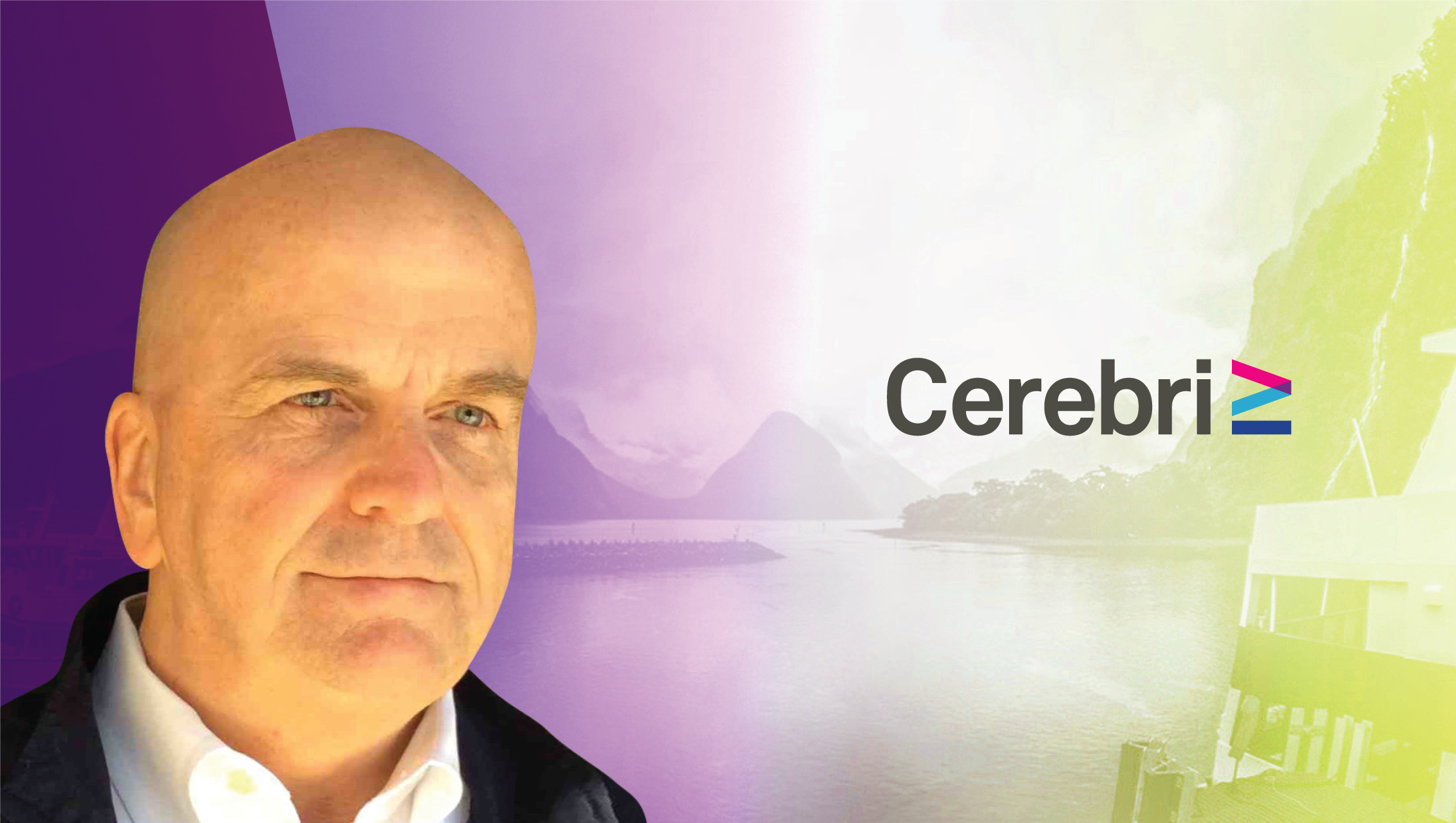Tell us about your role and journey into technology. What inspired you to establish Cerebri AI?
Cerebri AI is my fourth startup in total. My last company, which we sold in 2015, was a data-science company focused on bringing operations research to the supply chain of the largest retailers and distributors in the world. We built state-of-the-art models to optimize the operations of their major-scale distributions centers. We took data from the sensors in the conveyor system, all the way through to orders streaming in from e-commerce and figured out which orders would be done when. Making sure we could ship within the deadlines established for shipping by FedEx, UPS and third-party shippers. Very complex, very powerful tools for Walmart, CVS, UPS and the like. The one thing, which was a major challenge was these data-science models were highly tailored to each facility. It was very tough to scale the business. We did it, but the VCs were hard to convince.
Today, everything has changed. AI solves the scaling problem to a large extent because the models “learn”. There are always problems with data, but for all intents and purposes, AI has solved one of the major problems. Namely, the models being able to adapt over time, as the data changes. With a lot of experience doing this, AI was too massive an opportunity to pass up.
What is Cerebri AI and how does it fit into a modern CMO’s tech sack?
Cerebri AI helps major B2C enterprises. Mobile telephony and the Internet make everything happen faster and faster. Major enterprises must become proactive to survive. What my customer needs, I must give. Being reactive is no longer good enough. We cannot wait for the customer to come to us in our stores, branches, dealerships, etc. Everyone’s customers are two swipes on their phone from your competitor.
How can brands become proactive? Firstly, we need to stop treating a customer as a transaction and begin to respect their journey with us as their vendor. We must track all their activities across the enterprise. That data must be assembled into unique customer journeys, one for every customer or household, etc. This is not as hard to do as everyone thinks, because it does not require any major changes to complex, large-scale enterprise computing systems. Give me your data, in batch mode, on a daily, weekly, monthly cadence — whatever basis you have. Let me organize it into a systematic time series, that we call customer journeys, and let me then understand what KPIs you are challenged with.
Yes, it would be far better if all the data on a customer came to us in real-time, but that will not happen anytime soon. Corporate systems are moving to more real-time response rates, but Rome was not built in a day. Why speed matters is pretty simple, the more up to date my data is on a customer, the better my understanding of the customer — NOW — not yesterday, but right now. Once you have customer journeys built for each customer, then you can get down to work. What CMOs want to do is increase the commitment to their brand. They want to help sell things, and they want to help mitigate any damage to the customer relationship or brand if things do not go 100%.
Why are AI and Machine Learning models so valuable for a CMO? Have we not been doing this for decades? The answer is no, and more precisely, not to this level of precision. What Machine-Learning models do is help unwind the purchase experience. When a customer buys a product
or service, they accumulate experiences over time. I went to the web, I visited a store, I received an offer in the mail, SMS, email, etc. I went back to the web, I bought.
Awesome, but what is the value of each of these experiences on their own merit to the purchase decision? If we accumulate experiences, then we have to unwind this and get to the real value of each event. Machine-Learning models do this for you, which is awesome, but Cerebri AI goes one step further. We have filed multiple patents on our approach, which takes these outputs and scales them in dollars and cents. In other words, if I have established the relative weight of each event in a customer timeline or journey leading to a purchase, why not scale these to the value of the purchase? If I buy a $50,000 SUV and had 15 different events in my customer journey, we allocate the purchase price across all the events. For the first time ever, truly understanding what each event is worth to me as a CMO.
Our Machine-Learning models look at billions of patterns in the data to ascertain the relative weight of every event in the data. We value them in dollars and cents, so the obvious extension of this is that we can value events after the purchase. As a result, we can determine the customer’s commitment to your brand and your products — dynamically, if needed.
The cool thing about our approach is that we are not trying to measure a customer’s view or sentiment about an event. We are looking at the entire journey to understand where the customer is with their commitment to your brand and products. For instance, if you bought the SUV (above), then you go for your first service event, it is a disaster, the person at the dealership is awful to you and, as a result, you go on a flame-fest on Facebook or Twitter. You are not going to take your $50,000 vehicle, drive it into a field, and set it on fire. That would be stupid. Understanding the customer from digital data, without taking into context their purchase history, service history, etc., makes no sense today.
To be a proactive brand, you need to understand the customer journey itself, and the billions of patterns of interactions evidenced in your data. The only way to do this is to take full advantage of Machine Learning, scaling your results to dollars and cents, so everyone in your business can understand what it all means. One major advantage of this approach is you can no longer ‘game’ the system. The customer’s commitment to your brand and products is calculated in such fine detail. Looking at potentially millions of customers and billions of events, and all the patterns therein. We take 5-10 trillion calculations to derive, or train, a model. If Cerebri AI is right in its approach, and we are working successfully with several Fortune 500 companies, marketers can wave goodbye to NPS. Why do I need to know what 5% of my customer base thinks, when I can have 100% of my customers processed by the Cerebri Values system? So, we help the CMO, giving his or her team the answers they need for commitment to brand and products, and help with the specific KPIs they need to achieve.
We work with a Fortune 50 global automotive OEM that wanted to help a dealer group sell a certain model of car. Using our system, they saw a 7x increase in conversion to sales in an email campaign. Precise targeting of customers. No more spam emails. Everyone is treated as a person. In the end, this is measuring customer experience in a manner that was simply not possible, even a few years ago.
What are the core tenets of your business model for customer success ecosystem?
We believe customer success is achieved in three steps: Build, Measure, Lift. Build journeys as outlined above, from, all customer interactions — sales, marketing, service — in one integrated time series
We measure CX in terms of their commitment to the brand, and we score specific KPIs needed to achieve success.
We lift customer success by recommending Cerebri Actions to be taken to help fulfill key KPIs.
What are the challenges to modern-day revenue management platforms?
Revenue management decision-making faces the same issues we see when we are solving other business problems. The underlying models must encompass more and more data including social media, macroeconomic events, transactional histories, etc.
Revenue decisions are, in many instances, decisions that must be made in near real-time — hotel room deals, airfares, etc. However, the underlying models need to learn as well. So, using the best models, and swapping these models out on a timely basis is a non-trivial problem. In the end, all revenue management systems will be using Machine-Learning models. They will be in production and learning at the same time in different models. Swapping in these new “learned models,” as they diverge in their predictions, will become standard practice. The same methodology will be used across all functional business decision areas of an enterprise where the cost of model building, and deployment is modestly relative to their benefit in terms of increased revenue and decreased costs.
Why should brands reconsider their investments in AI/ML platforms?
If major enterprises do not invest in AI/ML models and platforms, they will go out of business. Of course, that is only conjecture, at this time, but after living through the introduction of the PC/Mac, the Internet, the world-wide-web, cell phones, and smartphones, my view is that AI and Machine Learning, are one of the most important technical discontinuities to hit us in the past 50 years. Not only is AI/ML a critical new way to help us make decisions, but customer expectations are rising at least as fast. Amazon, a heavy user of AI/ML, is now the gold standard for CX – imagine creating a unique home page for 300 million customers.
The other aspect of AI/ML is that it is a seriously important way to cut costs. Computers can crunch data looking at billions of patterns in making a decision. No coffee breaks. No overtime with 24×7 operations, etc. Better decisions, more timely decisions, omnichannel operations 24×7. The list of reasons why all CMOs should be investing heavily in AI/ML are too numerous to list.
Tell us about your predictions on the growing role of AI for businesses?
If business decisions are important, AI/ML will be used. The bigger the data set, the more likely that will be. I consider this ‘the revenge of the large enterprise.’ Why? Because they have data, lots and lots of data, accumulated, in many cases, over decades. We are moving from a world of ‘what the hell am I going to do with all this data. It costs a fortune, etc.,’ to a world where we never have enough data.
Which marketing and sales automation tools and technologies do you currently use?
We use Salesforce to manage our customers. We build software to manage AI/ML at the enterprise level, but this is a major effort, and worthy of another discussion.
What startups in the technology industry are you watching keenly right now?
I don’t spend much time looking at other startups. I have been wholly fixated on what my customer needs, ever since I had to make my first payroll a long time ago. Multiple startups later, I use the same approach. Go forth and talk to the customer, they will tell you what you need to know. I have status on three airlines as a result. We have customers in the US, Canada and Europe, so we have a very good view of where they are moving, in terms of new technology adoptions.
Which industries are best suited to benefit from AI/ML platforms and why?
B2C, B2B. Any industry, where you have enough customers for model building. As well as ‘G2C,’ a new term we have coined for ‘government to consumers.’
Tell us about your most outstanding digital campaign – (who was your customer and how did it perform?)
Cerebri helped one of our customers to increase their conversion to sales by 7x on a critical email campaign, that they were running to eliminate some products they had to sell. It took us 48 hours to do a derivative model and give them a ranking list of the most likely customers to buy in descending order.
How do you prepare for an AI-centric world as a CEO?
Get a frequent flyer number, you will need it. If you are curious, you are halfway there. If you accept the status quo, do something else. This is a serious game-changing technology, even the goalposts defining success have not been set yet.
How do you inspire your people to work with technology?
Our staff is extremely technical and comes ready on the technology front, no issues there.
One word that best describes how you work.
Intense.
What apps/software/tools can’t you live without?
Cerebri’s software, browser, Office, travel apps on iPhone, iPad, iWatch.
What’s your smartest work-related shortcut or productivity hack?
Economy Plus seats on planes, so I can work. Time flies, and I get home without a fully loaded inbox.
What are you currently reading?
I read a lot of web content on business and technology. Books, I either read sci-fi or history. I am finishing “The Second World Wars: How the First Global Conflict Was Fought and Won” by Victor David Hanson. An amazing book.
What’s the best advice you’ve ever received?
Listen.
Something you do better than others — the secret of your success?
I can connect the dots strategically, like everyone else, but often I see the dots that aren’t obvious, that allow the connections to be made, especially from a product point of view.
Tag the one person (or more) in the industry whose answers to these questions you would love to read:
Steve Jobs.
Thank you, Jean! That was fun and hope to see you back on MarTech Series soon.
I am currently co-founder / CEO of Cerebri AI Inc. ( Austin & Toronto ).
I started my career with PwC, working in Ottawa and Paris. After the graduating from the LSE, I joined Wood Gundy ( CIBC World Markets ). As VP Investment Banking, I was lead underwriter for 3 of the 4 largest public companies in Canada. I helped raise +US$4B in Canada, US and Europe.
I left investment banking and started a VC fund in Montreal, investing in startup tech, three companies of which went public, one 24 years later! After 15 yrs in finance, I decided to run companies rather than finance them.
I helped turn a 3-man shop called Metrowerks into a premier programming tools vendor. Metrowerks CodeWarrior, was named Software Product of the Year by MacWorld Magazine. CodeWarrior was used to build the vast majority of software in popular use on the Macintosh in the 1990s including Adobe’s apps, Microsoft Office, and others. In 1995, a columnist in MacWeek said Metrowerks saved Apple Computer ! MacWorld Mag. awarded me a World Class Award for Outstanding Contribution to the Macintosh Platform. I was Finalist for the E&Y Entrepreneur of the Year Award in Austin. Metrowerks was acquired by Motorola.
Subsequently, Motorola named me VP Biz Dev for their semiconductor business, where I invested over $450M in M&A in 14 mths. After Motorola, I started a supply chain software company focused on the F500 including Walmart, CVS, Best Buy, and McLane. 20% of our were Masters/PhDs in OR and and math. Reddwerks was a pioneer in the Internet of Things ( IoT ). Reddwerks was the fastest growing company in Austin according to the Austin Business Journal in 2010. Reddwerks was purchased in 2015 by Dematic.
Cerebri AI Inc., a venture-backed pioneer in artificial intelligence and machine learning, is the creator of Cerebri Values™, the industry’s first universal measure of customer success. Cerebri Values quantifies each customer’s commitment to a brand or product and dynamically predicts “Next Best Actions” at scale, which enables major enterprises to focus on accelerating profitable growth. Headquartered in Austin with offices in Toronto and Washington, DC, the company has 50 employees who have been awarded over 130 patents to date. To learn more, visit cerebri.com.
The MTS Martech Interview Series is a fun Q&A style chat which we really enjoy doing with martech leaders. With inspiration from Lifehacker’s How I work interviews, the MarTech Series Interviews follows a two part format On Marketing Technology, and This Is How I Work. The format was chosen because when we decided to start an interview series with the biggest and brightest minds in martech – we wanted to get insight into two areas … one – their ideas on marketing tech and two – insights into the philosophy and methods that make these leaders tick.













Comments are closed.